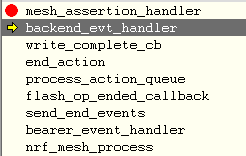I am encountering an issue with PERSISTENT_STORAGE enabled. Currently I have a device set up to rapidly send out messages to test the sequence number updating and block allocation procedure. I notice that when the sequence number approaches the next block by (NETWORK_SEQNUM_FLASH_BLOCK_THRESHOLD) amount and triggers the seqnum_block_allocate() (see the code snippet below) I get a mesh assertion error.
uint32_t net_state_seqnum_alloc(uint32_t * p_seqnum)
{
// Attempt to allocate the sequence number before it is fully restored from persistent storage.
if (!m_status.is_synchronized)
{
return NRF_ERROR_FORBIDDEN;
}
if (m_net_state.seqnum < m_net_state.seqnum_max_available)
{
/* Check if we've reached the seqnum threshold for a state transition. */
uint32_t threshold = NETWORK_SEQNUM_IV_UPDATE_START_THRESHOLD;
if (m_net_state.iv_update.state == NET_STATE_IV_UPDATE_IN_PROGRESS)
{
threshold = NETWORK_SEQNUM_IV_UPDATE_END_THRESHOLD;
}
bool ivu_triggered = false;
if (m_net_state.seqnum >= threshold)
{
m_net_state.iv_update.pending = true;
ivu_triggered = iv_update_trigger_if_pending();
}
if (!ivu_triggered && m_net_state.seqnum >= m_net_state.seqnum_max_available - NETWORK_SEQNUM_FLASH_BLOCK_THRESHOLD)
{
seqnum_block_allocate();
}
/* Get the sequence number after doing the state updates, as they might
* trigger changes to it. */
uint32_t was_masked;
_DISABLE_IRQS(was_masked);
*p_seqnum = m_net_state.seqnum++;
_ENABLE_IRQS(was_masked);
return NRF_SUCCESS;
}
else
{
seqnum_block_allocate();
return NRF_ERROR_FORBIDDEN;
}
}
Mesh assertion error at line NRF_MESH_ASSERT_DEBUG(*p_flags & MESH_CONFIG_ENTRY_FLAG_BUSY); in the code:
static void backend_evt_handler(const mesh_config_backend_evt_t * p_evt)
{
const mesh_config_entry_params_t * p_params = entry_params_find(p_evt->id);
if (p_params == NULL && MESH_CONFIG_BACKEND_EVT_TYPE_ERASE_COMPLETE == p_evt->type)
{ /* Check whether entry with known file id was deleted. */
const mesh_config_file_params_t * p_file = file_params_find(p_evt->id.file);
NRF_MESH_ASSERT(p_file);
return;
}
NRF_MESH_ASSERT(p_params);
mesh_config_entry_flags_t * p_flags = entry_flags_get(p_params, p_evt->id);
NRF_MESH_ASSERT_DEBUG(*p_flags & MESH_CONFIG_ENTRY_FLAG_BUSY);
*p_flags &= (mesh_config_entry_flags_t)~MESH_CONFIG_ENTRY_FLAG_BUSY;
if (p_evt->type == MESH_CONFIG_BACKEND_EVT_TYPE_STORAGE_MEDIUM_FAILURE)
{
const nrf_mesh_evt_t evt = {
.type = NRF_MESH_EVT_CONFIG_STORAGE_FAILURE,
.params.config_storage_failure = {
.id = p_evt->id, /*lint !e64 Type mismatch */
}
};
event_handle(&evt);
}
if (mesh_config_is_busy())
{
dirty_entries_process();
}
else
{
m_emergency_action = false;
nrf_mesh_evt_t evt = {.type = NRF_MESH_EVT_CONFIG_STABLE};
event_handle(&evt);
}
}
Callstack:

What is this assertion trying to achieve and any ideas why its being triggered?
If I continue to let the application run, the next time it attempts to allocate a sequence block it fails repeatedly until the "if (m_net_state.seqnum < m_net_state.seqnum_max_available)" check fails and starts returning NRF_ERROR_FORBIDDEN.
Using mesh v4.1


